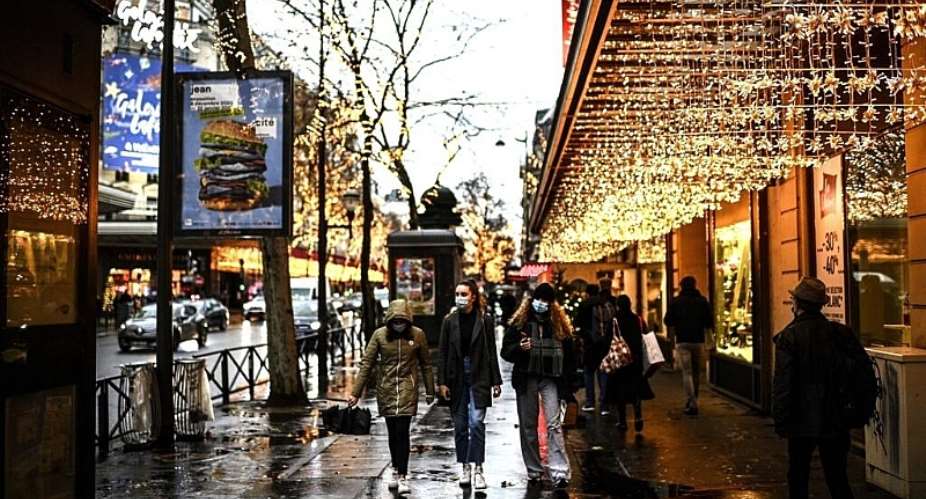France's Minister for Energy Transition, Agnés Pannier-Runacher, on Thursday unveiled the country's energy saving plan - warning there was "an urgent need" for action in a fight that would carry on well beyond the winter.
"This is the challenge for the next 30 years," said Pannier-Runacher after a meeting with ministers and company managers outside of Paris.
The cross-sector measures, 15 of which will be introduced ahead of the winter, are in response to the crisis in Ukraine.
They also form part of climate change plans to reduce energy production by at least 10 percent over the next two years, with an overall 40 percent decrease recommended for 2050.
“If the whole nation manages to meet this objective, which is purely voluntary – you don't need a decree of law – if we all mobilise to meet it, in the worst scenario this is how we will spend the winter," said French President Emmanuel Macron earlier in the day, defending the plan in front of entrepreneurs.
French households will need to consume less electricity during peak hours in the morning and evening.
Hot water will be switched off in the restrooms of public buildings and municipalities will be told to reduce water temperatures at public swimming pools by 1 degree Celsius
The fixed allowance for teleworking state employees will increase.
Employees will be encouraged to travel by train instead of plane for journeys of less than four hours, while those driving should travel at 110 km/h on highways, not 130 km/h.
Pannier-Runacher also wants to reduce lighting in public establishments and switch to LED energy-saving lamps.
Concrete actions for companies
The government plan includes all companies, with certain measures specified for the trade, market services and tourism sectors.
In supermarkets, light should be reduced by 30 percent, while neon signs and lights are to be switched off once the market is closed.
If there are no customers or staff in hotels, the temperature should be turned down to 17°C.
Some companies have already announced cost-cutting measures, including Vinci, which manages airports. It announced that all its airports would be capped at 17°C.
Meanwhile lighting in sports stadiums before and after matches is to be reduced.
Commuting
France's Transport Ministry is encouraging commuters to carpool by paying a bonus of 100 euros. It also plans to make the payment of public transport and public bicycle service packages more attractive for employers.
The government is also pushing for efficient heating for housing, and use of better thermostats. This includes an "every gesture counts" campaign intended to encourage the French to pay attention to their daily energy consumption.
Other ideas for energy belt-tightening include changing the date of when central heating starts in buildings.
Minister Delegate for Housing Olivier Klein proposed delaying the period during which heaters are switched on to 1 November instead of 15 October, and ending it earlier on 1 April instead of 15 April.
"That month would allow an energy saving of 12 percent," he said.
Earlier Thursday, Pannier-Runacher was a guest on French radio station RTL, saying that the mayors of France would be deciding their own municipal policies on electricity belt-tightening, including on whether they would put up citywide Christmas decorations.
Many had decided to install them later in December, she said, adding the collective measures did not mean France had to “stop living.”
She said thes general mobilisation was aimed at everyone, not just French citizens and public buildings.
Large companies are also being urged to comply with energy-saving measures, such as lowering the thermostat in offices to a solid 19°C.
“It would be unacceptable to ask the French to make an effort, and for these major institutions not to do so,” she said.





 There’s nothing you can do for us; just give us electricity to save our collapsi...
There’s nothing you can do for us; just give us electricity to save our collapsi...
 Ghanaian media failing in watchdog duties — Sulemana Braimah
Ghanaian media failing in watchdog duties — Sulemana Braimah
 On any scale, Mahama can't match Bawumia — NPP Youth Organiser
On any scale, Mahama can't match Bawumia — NPP Youth Organiser
 Never tag me as an NPP pastor; I'm 'pained' the 'Akyem Mafia' are still in charg...
Never tag me as an NPP pastor; I'm 'pained' the 'Akyem Mafia' are still in charg...
 Your refusal to dedicate a project to Atta Mills means you never loved him — Kok...
Your refusal to dedicate a project to Atta Mills means you never loved him — Kok...
 2024 elections: I'm competent, not just a dreamer; vote for me — Alan
2024 elections: I'm competent, not just a dreamer; vote for me — Alan
 Avoid pre-registered SIMs, buyer and seller liable for prosecution – Ursula Owus...
Avoid pre-registered SIMs, buyer and seller liable for prosecution – Ursula Owus...
 Election 2024: Mahama has nothing new to offer Ghanaians, Bawumia is the future ...
Election 2024: Mahama has nothing new to offer Ghanaians, Bawumia is the future ...
 OSP files fresh charges against ex- PPA Boss
OSP files fresh charges against ex- PPA Boss
 Withdraw unreasonable GH¢5.8m fine against former board members – ECG tells PURC
Withdraw unreasonable GH¢5.8m fine against former board members – ECG tells PURC
